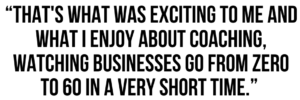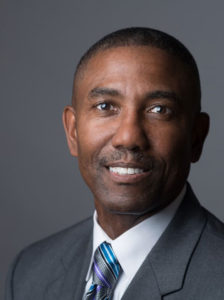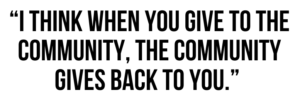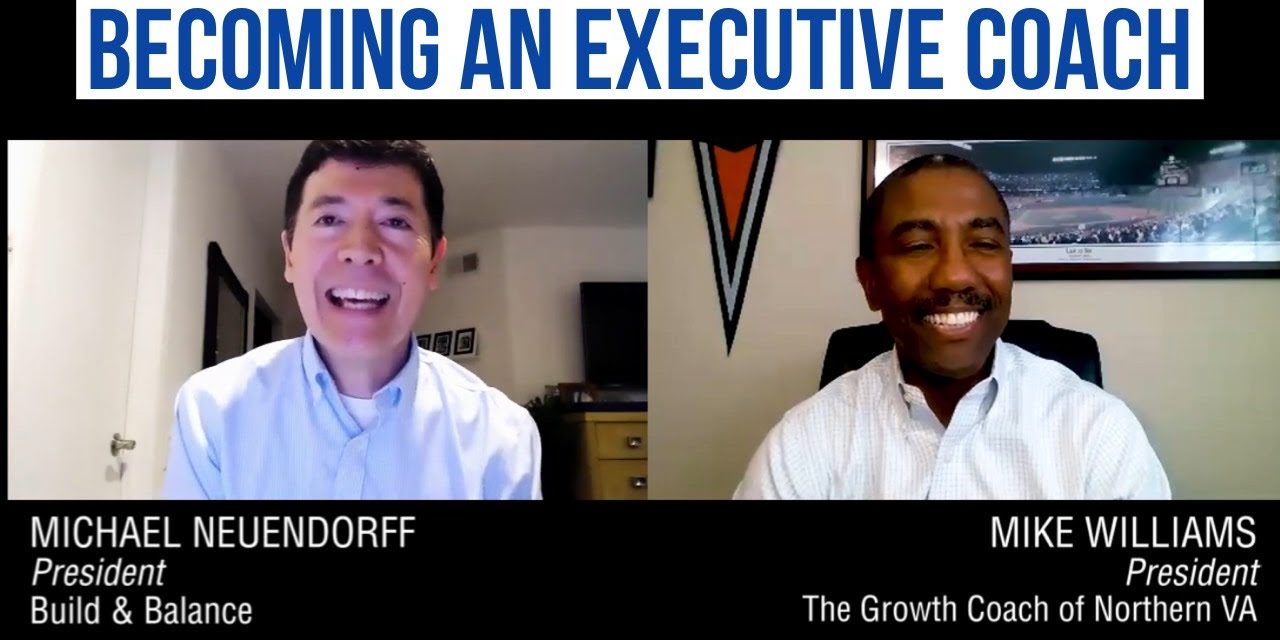Recently, our own Michael Neuendorff had the opportunity to ask Mike about his career to date in leadership coaching and sales training.
••••
Michael Neuendorff: First of all, I want to go back to your time at the Coca-Cola Company. You had a successful 20-year long career going there. What made you leave to enter into the world of coaching?
Mike Williams: Well, I always admired business owners so I wanted to become one myself. When I looked back at my life and my career, the common thread was teaching, coaching and development. I began with all that in the military. I did that at ExxonMobil, Mobil Chemical, and also at Coca-Cola. Teaching and training was a natural thing for me and it would be a natural progression to go into that line of business on my own.
So, I started looking at opportunities to do that. The Growth Coach, as you know, is a franchise; a turnkey business that also gives you room to do some things on your own. I liked that approach, so I jumped into coaching with The Growth Coach about 5 ½ years ago.
Michael Neuendorff: We share that common history with The Growth Coach. That’s where we met and that’s how I started in the world of coaching, too. We have some parallels in our lives.
Mike Williams: Absolutely.
Michael Neuendorff: Looking back on your first year in business for yourself, what would you have done differently as a coach?

Mike Williams: I would have spent more time talking to experienced coaches to really get the lay of the land before I got going full speed. For example, I would have flown out to California and spent some time with you, watching how you work. I would have talked with a lot of other coaches and watched them in action too.
Michael Neuendorff: That is good advice, to spend some time with experienced coaches, seeing how they operate and where they invest their resources. Now, looking back at your entire coaching career to date, what’s been your greatest enjoyment from being a Growth Coach?
Mike Williams: Just working with people. My very first client was an architect who was struggling with a lot of issues.
He wasn’t organized at all and he didn’t have a roadmap for growing his business. So, when we first met, we had that conversation. We did some business strategy planning. We started outlining where he wanted to go, and what he wanted to do.
After about 6 to 8 months, he found himself up 20% in his business. He hires an assistant and he hires another architect. And then we have another conversation. He says: “Hey, Mike, I’m thinking about moving to another market because it looks like that’s a good plan for me. I’ve already started looking at rental places there. But first I know I’ve got to grow my business here to be able to move.”
When I got off the phone with him, it felt like I scored a touchdown. He went from: “I don’t know where I’m going” to “I’m ready to grow my business in a new market.” I felt so good that the dialogue that I started with him was now making a positive change in his life.
That’s what was exciting to me and what I enjoy about coaching, watching businesses go from zero to 60 in a very short time.
Michael Neuendorff: Wow, that’s fantastic. And that was right out of the gate! When you look back over the 5 ½ years or so, what do you regard as your greatest success story in coaching?
Mike Williams: I’ve had a lot of them. There was a plumber who was working out of the basement in his house. And I worked with him to get him out of his basement and into a nice office and expand his company from 2 to over 20 trucks.
I currently work with an IT company that started with 6 people and now has 65 employees. The owner is doing a lot of great things in the community and doing a lot for his employees. I’m proud of the team building and business development coaching I did there. So those are just a couple of clients that stand out in my mind. But any time somebody needs help and I can help solve some problems for them, I feel good about that.
Michael Neuendorff: Yeah, that’s terrific. Now, based on your long sales background, you’re probably better than average at selling coaching. What are your best tips for coaches who want to improve their ability to sell themselves as a coach?
Mike Williams: First off, I feel that coaches need to know themselves really well. What are your areas of expertise? What are you good at? What are you not so good at? Learn about yourself by taking a class, a test, whatever it takes. Other things I stress are: be genuine, listen well, and work to solve problems instead of trying to sell people on something. Be a solution, a true support person.
Another thing, there are a lot of coaches in this industry that really don’t know how to sell. So, it’s essential to learn. If you’ve never taken a sales course, if you’ve never read a book on the topic, you’ve got to do that in order to understand what selling is all about.

You’ll hear a lot of coaches saying: “Well, you know, I don’t do a lot of sales training because I’m not good at sales.” Well, I think if you’re a coach, you want to be an influencer. You need to have that selling skill. But you and I also know that it’s a different kind of “sell.” You don’t want to talk people into hiring you as a coach simply because you think they should. They have to reach that conclusion for themselves.
That’s why I think sales training is very important for coaches. It’s great that you’ve been in business your whole life and now you’re going to help business owners, or you’ve been in academia and you’ve been teaching and now you want to jump in as a coach. But first, you need to know something about the art and the science of selling, and be able to do that in a way that’s problem solving. If you don’t have a background in sales, you need to get some training in that area.
Michael Neuendorff: That’s so true. By learning how to coach, you learn how to draw solutions out of other people. But you can’t ever sell the coaching.
My next question is related to thought leadership. Not only do you need to learn how to sell yourself as a coach, you need to also learn how to distinguish yourself as a coach. There are new coaches entering the profession every year and it’s becoming more and more competitive. How do you establish yourself as a thought leader and coach? What have you found to be effective?
Mike Williams: I think it kind of goes hand-in-hand with building your brand, and you really want to brand yourself as the go-to person. You want to brand yourself as the expert. So how do you do that? Well, you can start by blogging. You can write about topics that you already know a lot about or ideas that you want business owners to think about.
I do a lot of blogging, mostly on a weekly basis. Monthly newsletters are a good idea, too. If you’re putting something out there that can benefit somebody, and you can do that on a weekly or a monthly basis, you should do that.
I also use video. I like interviewing other business owners to pick their brains. I like to find out what’s going on with them and what kind of problems they’re up against so other business owners know that it’s not just them. We all go through highs and lows. We all win and we all sometimes lose.
There are a lot of things that you can do locally to put yourself out there as a thought leader, whether you’re talking about just basic community service, whether you’re talking about chambers of commerce, whether you’re talking about other organizations where you can volunteer. And I’m not saying you should do everything for free, but when you do, position yourself so you’re doing work that’s visible to the community and you’re providing a valuable resource. I think it’s important to do that. I think when you give to the community, the community gives back to you.
Michael Neuendorff: Yeah, I totally agree with that. A few years ago, I felt this strong calling to start giving back. Recently, I joined the Nasdaq Entrepreneurial Center where I provide pro bono coaching to startup founders in 12-week programs. When you’re coaching somebody it’s about helping them to achieve a milestone. It’s been a real reward for me.
Mike Williams: Anybody who’s been in this business knows it’s not about the money. If you’re in it, if you’re truly in it, because you and I know that there are a lot of coaches out there who aren’t making a ton of money. But you’re creating value and doing what you want to do in life.
Michael Neuendorff: Exactly. What gets me up on Monday morning is the joy of work, not the joy of cash, although we all have to make a living, too. I’ve got one more question for you, Mike. How do you stay on the path of learning and growing?
Mike Williams: That’s a really good question, Michael. One would be ongoing training. This year alone I’ve done additional team building training, some performance management stuff, and, in the midst of this pandemic, ZOOM training. So continuous training is definitely important.
 Books are important too. I know you’re an avid reader. I don’t do as much reading as I probably should, but I’m still a big believer in books. I’ll go back to the “Seven Habits of Highly Effective People.” I’ll go back to “Think and Grow Rich.” I’ll go back to some of the classic books by people like Dale Carnegie.
Books are important too. I know you’re an avid reader. I don’t do as much reading as I probably should, but I’m still a big believer in books. I’ll go back to the “Seven Habits of Highly Effective People.” I’ll go back to “Think and Grow Rich.” I’ll go back to some of the classic books by people like Dale Carnegie.
Michael Neuendorff: Mike, this has been a real pleasure. I’ve known you for many years. I’ve enjoyed being a peer of yours in the coaching world and now having this opportunity to talk to you about coaching and some of your coaching successes. We’ve learned a lot. I just want to thank you very much for being with us today.
Mike Williams: Thanks for having me. I certainly enjoyed it as well. And I really just appreciate the opportunity. It’s been fun.
You can view the original video interview by clicking this link.
You can learn more about Mike Williams and his business here.
Take a look at our other Conversations with Coaches here, or view the full playlist on YouTube here.
Here are more coaching interviews from Bay Area Executive Coach:







